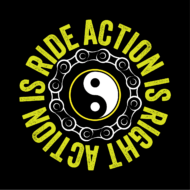Whenever you feel the Beast sapping your will, do something – anything – that will improve your situation in even the smallest way. Straighten a crooked picture. Put all your stray pencils into a cup.
Taming the Beast
Category Archives: Philosophy & Thought
Joseph Campbell and The Power of Myth
Or find your Sacred Space
I have been listening to the audio version of an old PBS series with Bill Moyer interviewing teacher and philosopher Joseph Campbell, The Power of Myth. To say it’s been a game-changer for me would be a massive understatement. What an absolute beauty of a man and intellect. I can only imagine what it must have been like to be a student of his, but I feel fortunate to have his books and items like this series still around. What an absolute delight it is to listen to these men in conversation.
BILL MOYERS: What does it mean, to have a sacred place?
JOSEPH CAMPBELL: This is a term I like to use now as an absolute necessity for anybody today. You must have a room, or a certain hour a day or so, where you do not know what was in the newspapers that morning, you don’t know who your friends are, you don’t know what you owe to anybody, you don’t know what anybody owes to you, but a place where you can simply experience and bring forth what you are and what you might be. This is the place of creative incubation. And first you may find that nothing’s happening there, but if you have a sacred place and use it, and take advantage of it, something will happen.
BILL MOYERS: This place does for you what the plains did for the hunter…
JOSEPH CAMPBELL: For them the whole thing was a sacred place, do you see? But most of our action is economically or socially determined, and does not come out of our life. I don’t know whether you’ve had the experience I’ve had, but as you get older, the claims of the environment upon you are so great that you hardly know where the hell you are. What is it you intended? You’re always doing something that is required of you this minute, that minute, another minute. Where is your bliss station, you know? Try to find it. Get a phonograph and put on the records, the music, that you really love. Even if it’s corny music that nobody else respects, I mean, the one that you like or the book you want to read, get it done and have a place in which to do it. There you get the “thou” feeling of life. These people had it for the whole world that they were living in.
Most mornings, I get up around 4:30 and head into my basement where I do some yoga or exercise, meditate, read or listen to items like the audiobook above, make coffee, read and answer emails from friends, and prepare for the day. I purposely avoid cracking open the Internet or anything external until after I’ve done this, then headed upstairs to see my kids off to school and wife off to work.
Yesterday, while drywalling a new room in my basement, listening to Mr. Moyers and Mr. Campbell talk, the section above deeply resonated with me. Mr. Campbell definitely knew his stuff.
The last week or so, the renovations and the associated temporary restructuring of living spaces (one of my kids is now sleeping in my home office space) have made it difficult for me to get this time in, but I’m ok, knowing that in another few days, they’ll be done and I’m looking forward to getting back into the routine – back into my sacred space.
Productivity & Distraction
Cal Newport dropped Staying Productive on Distracted Days over on his blog and it’s a nail-on-the-head observation for me.
“Productivity” is a slippery term. It’s often used to refer exclusively to the rate at which you produce value for your business or employer. I tend to apply it more broadly to describe the intentional allocation of your time and attention toward things that matter to you and away from diversions that don’t.
A lot of days, this probably involves a solid push on professional activities, as craft is an important part of cultivating a deep life. But not every day. If there are consequential national events transpiring, or you’re dealing with a crisis in your personal life, or you’re not feeling well, a productive day doesn’t necessarily require steady progress through a task list.”
Since the switch to working from home as a result of Covid-19, this has become a daily reality for me. I’ve come to look at it more as being ‘productive’ on the project of what David Cain likes to call ‘getting better at being human’. Sometimes that means day-job work and sometimes it applies to other things as well. In the end, both streams benefit.
